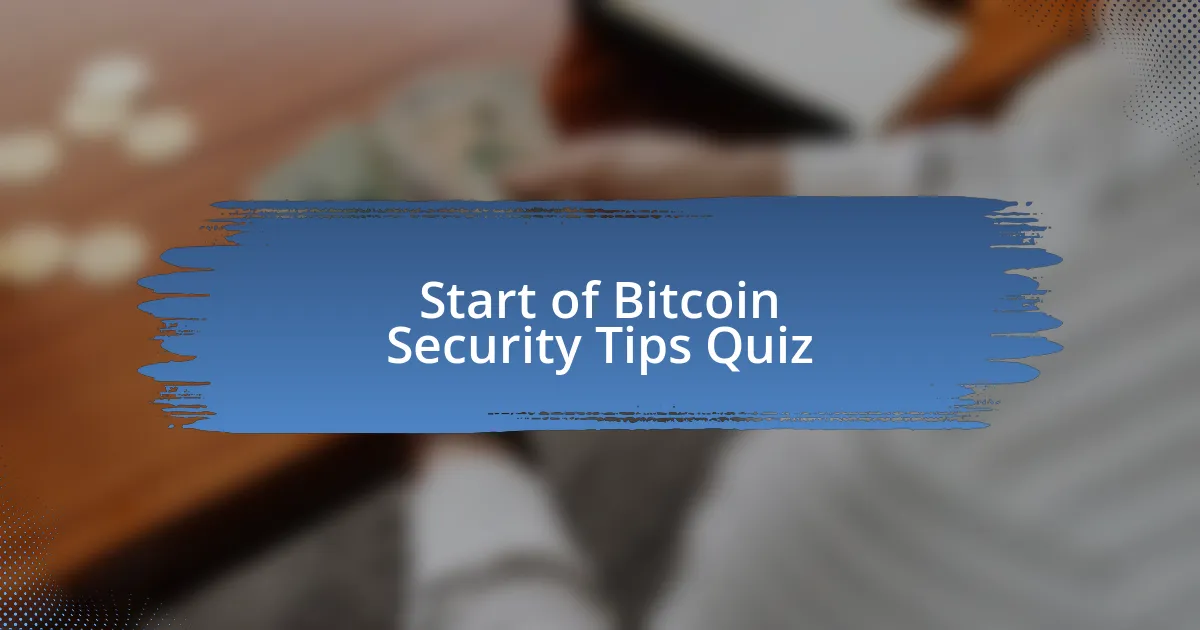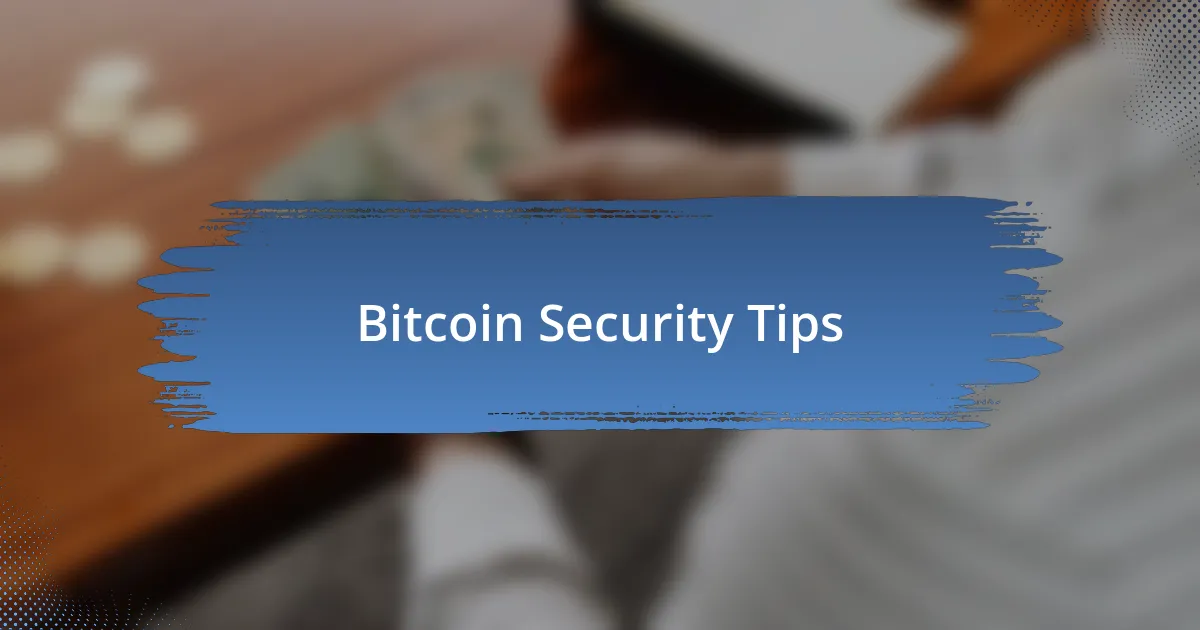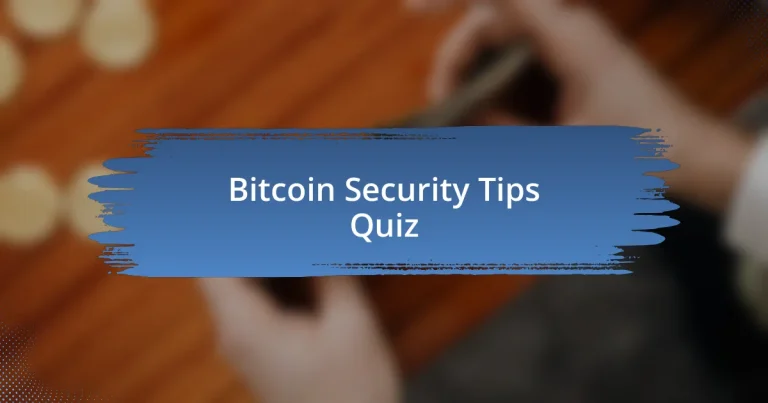
Start of Bitcoin Security Tips Quiz
1. What is the primary purpose of using up-to-date antivirus and firewalls for Bitcoin transactions?
- To prevent security vulnerabilities that can lead to hacking.
- To increase transaction speeds and efficiency.
- To enhance the visual interface of the Bitcoin wallet.
- To monitor market prices in real-time.
2. How should you handle Bitcoin exchanges to minimize security risks?
- Transfer Bitcoins from the exchange-based wallet to a wallet running on a computer under your control as quickly as possible.
- Share your exchange wallet credentials with friends for convenience.
- Leave your Bitcoins in the exchange wallet indefinitely.
- Use the same password for your exchange and email accounts.
3. Why is it important to use a Bitcoin client that allows changing addresses with each transaction?
- To speed up the transaction processing time.
- To ensure compatibility with all wallet types.
- To prevent double spending in all scenarios.
- To enhance privacy and security of your transactions.
4. What is the recommended practice for separating transactions into different wallets?
- To store all funds in a single wallet for easy access.
- To keep a wallet for day-to-day transactions of small amounts, to be topped up when necessary.
- To frequently change the wallet address for every transaction.
- To share private keys between multiple wallets for convenience.
5. How can you minimize the exposure of data between online and offline computers?
- By using a single computer for all tasks without separation.
- By dedicating one USB key for moving data between online and offline computers.
- By sharing data via email attachments and cloud services.
- By frequently connecting online devices to the offline computer.
6. What is the benefit of dedicating an offline computer exclusively to running an offline wallet?
- To minimize its potential exposure to viruses.
- To store different types of cryptocurrencies.
- To increase transaction speeds significantly.
- To enable access to online trading platforms.
7. Why is it advisable to use a device solely dedicated to cryptocurrency activities?
- To maximize profits from cryptocurrency trading.
- To increase transaction speeds significantly.
- To access multiple exchanges simultaneously.
- To drastically lower your odds of vulnerability.
8. What are common devices that are more likely to become infected with viruses or ransomware?
- Devices used for surfing, work, and pleasure activities.
- Devices specifically for remote control operations.
- Devices exclusively for word processing and spreadsheets.
- Devices used for gaming and streaming only.
9. How can you enhance the security of your Bitcoin communications?
- By sharing your private keys with trusted friends for secure transactions.
- By using public Wi-Fi to facilitate faster connections.
- By avoiding any form of password protection on your communications.
- By using TLS/SSL encryption to prevent interception and man-in-the-middle (MitM) attacks.
10. What is the purpose of certificate pinning in crypto wallet security?
- To allow the app to connect to any available public server.
- To ensure the app communicates only with trusted servers, preventing interception.
- To establish a backup connection in case the main server fails.
- To increase the speed of transactions by reducing server response time.
11. Why should users avoid using public Wi-Fi for transactions?
- To avoid potential security risks associated with public networks.
- To access more cryptocurrency options available on public connections.
- To ensure a faster internet connection while transacting.
- To enjoy free internet without any restrictions.
12. What is the benefit of using a VPN for accessing crypto wallets over public or untrusted networks?
- To increase internet speed for better transactions.
- To secure further communications and protect data from interception.
- To reduce the fees associated with transferring crypto.
- To allow anonymous trading of cryptocurrencies.
13. How can you mitigate physical threats to crypto wallet devices?
- By using Hardware Security Modules (HSMs) or secure elements for key storage.
- By using weak passwords to facilitate access.
- By storing the wallet in a public place to ensure easy access.
- By disabling all security features for convenience.
14. What is the purpose of biometric authentication in crypto wallet security?
- To simplify the password entry process for users.
- To track transaction history for better management.
- To secure wallet access using fingerprints, facial recognition, etc.
- To create a backup of wallet data for recovery.
15. What is the benefit of enabling remote wipe capabilities in crypto wallets?
- To erase wallet data if a device is lost or stolen.
- To increase the number of cryptocurrencies supported by the wallet.
- To enhance transaction speeds on the blockchain.
- To improve user interface designs for the wallet app.
16. Why is it important to keep software up to date for Bitcoin wallets?
- To prevent hackers from exploiting outdated software vulnerabilities.
- To improve the appearance of the wallet interface.
- To increase the transaction speed of Bitcoin.
- To reduce the amount of stored data in the wallet.
17. What should you do in case of a computer failure to recover your Bitcoin wallet?
- Uninstall all Bitcoin-related software immediately.
- Seek help from your Internet Service Provider.
- Format your computer and reinstall the operating system.
- Back up your entire Bitcoin wallet early and often, including all wallet.dat files.
18. Where should you store your Bitcoin wallet backups?
- At multiple secure locations, such as on a USB, CD, or another removable device.
- In an email attachment sent to yourself.
- On your social media account`s private messages.
- On a public server accessible via the internet.
19. How should you ensure the security of your Bitcoin wallet backups?
- Leave the backup file unprotected on your desktop.
- Use a strong password and encrypt the backup.
- Share the backup with friends for safekeeping.
- Store backups solely on the exchange server.
20. What is the importance of using strong passwords and two-factor authentication in crypto wallet security?
- To enhance the visual appeal of the wallet interface.
- To lower the cost of managing crypto transactions.
- To simplify transaction processes and improve efficiency.
- To add an extra layer of defense against unauthorized access.
21. How does two-factor authentication work in crypto wallets?
- It generates a unique password for every transaction without user input.
- It requires users to provide two forms of identification, such as a password and a one-time code sent to their mobile device.
- It sends a notification to friends about your transaction details.
- It only requires a fingerprint scan to access the wallet.
22. What is the benefit of using a multi-signature wallet in crypto security?
- It allows for faster transaction processing speeds without additional security.
- It guarantees that all transactions are free of fees and costs.
- It ensures that no single party has complete control over the funds by requiring more than one private key to authorize transactions.
- It simplifies wallet management by consolidating all keys into one.
23. How does a multi-signature wallet reduce the risk of unauthorized access?
- An attacker would need to compromise multiple keys simultaneously to gain control of the assets.
- Only one key is required to approve all transactions.
- It eliminates the need for passwords altogether.
- A single key is sufficient to access the wallet securely.
24. What is the recommended setup for a multi-signature wallet?
- A setup requiring only one key for all transactions simultaneously.
- A setup that requires two out of three keys to authorize any outgoing transaction.
- A setup where five out of five keys are needed for any outgoing transaction.
- A setup that uses no keys but relies on a single password for authorization.
25. Why is it crucial to use a non-custodial cold hardware wallet for long-term Bitcoin storage?
- To make it simple to transfer coins between exchanges.
- To allow easier access to funds from anywhere.
- To enable automatic backups of your wallet online.
- To ensure that your private keys are not stored on an exchange or other vulnerable location.
26. What is the primary benefit of using a hardware wallet like Ledger Flex?
- It allows for instant transactions without any fees.
- It enables users to access their funds from any device.
- It provides enhanced security by storing private keys offline.
- It guarantees equal distribution of cryptocurrency.
27. How can you protect your seed phrase from physical theft?
- By storing it securely and using strong passwords and two-factor authentication.
- By writing it down and keeping it in your wallet.
- By storing it in a text file on your computer.
- By sharing it with trusted friends only.
28. What is the purpose of Shamir`s Secret Sharing in crypto security?
- To create a backup of crypto wallets automatically.
- To provide advanced security by dividing a secret into multiple parts, requiring multiple parts to reconstruct the secret.
- To encrypt messages during Bitcoin transactions.
- To generate random keys for secure communications.
29. Why is it important to regularly update your mobile device or computer operating systems and software?
- To keep your Bitcoin wallet software up to date with the latest security fixes and definitions.
- To enhance the aesthetics of the user interface.
- To improve battery life and extend device functionality.
- To make the device run faster without any lag.
30. What is the significance of using a secure, offline environment to generate paper wallets?
- To make printing easier and quicker for users.
- To increase the chances of data recovery in case of loss.
- To allow easier access to digital copies of the wallets online.
- To ensure that the paper wallets are not compromised by malware or other online threats.

Quiz Completed Successfully!
Congratulations on completing the quiz on Bitcoin Security Tips! You’ve engaged with important questions and explored key concepts that can help you better protect your digital assets. Whether you learned about the importance of strong passwords, two-factor authentication, or keeping your private keys secure, each piece of information contributes to a safer Bitcoin experience.
Reflecting on what you’ve just covered, it’s clear that understanding security measures is essential for anyone entering the world of cryptocurrency. You’ve gained insights into best practices that can significantly reduce your risk of falling victim to fraud or theft. Remember, knowledge is the first line of defense when dealing with digital currencies.
To continue your journey towards a safer Bitcoin experience, we invite you to check out the next section on this page dedicated to ‘Bitcoin Security Tips’. This resource will provide you with even more detailed information and practical advice. Your understanding will deepen, and you’ll be equipped with the tools needed to navigate the Bitcoin landscape confidently.

Bitcoin Security Tips
Understanding Bitcoin Security Fundamentals
Bitcoin security fundamentals involve the principles that ensure the safety of your cryptocurrency. Key elements include private keys, wallets, and transactions. Private keys are crucial for accessing and managing your Bitcoin. Wallets hold your Bitcoin and can be of various types: hardware, software, or paper. Transactions must be conducted over secure networks to prevent exposure to potential vulnerabilities. These basics provide the foundation for advanced security practices.
Utilizing Hardware Wallets for Enhanced Security
Hardware wallets are physical devices designed to securely store private keys offline. They provide superior protection against malware and online hacks. Popular options include Ledger and Trezor. These devices encrypt your keys and require physical access to initiate transactions. Using a hardware wallet significantly reduces the risk of unauthorized access to your Bitcoin.
Implementing Strong Passwords and Two-Factor Authentication
Strong passwords are essential to protecting your wallets and exchanges. A good password combines letters, numbers, and symbols, and avoids common phrases. Two-factor authentication (2FA) adds an extra layer of security, requiring a second verification step during login. This could be a code sent to your mobile device or an authentication app. By using these methods, you can significantly reduce the risk of account compromise.
Regular Software Updates and Security Patches
Keeping your wallet software and devices updated is critical for security. Updates often include the latest security patches that address known vulnerabilities. Ignoring updates can leave systems exposed to attacks. Always ensure that any software you use comes from reputable sources. This practice helps maintain a strong defense against potential exploits.
Recognizing Phishing Scams and Social Engineering
Phishing scams often target Bitcoin users to steal credentials or private keys. These scams may appear as legitimate emails or websites. Always double-check URLs and verify the source before clicking links. Be wary of unsolicited communications requesting personal information. Educating yourself on these tactics can prevent financial loss and safeguard your Bitcoin assets.
What are some essential Bitcoin security tips?
Essential Bitcoin security tips include using strong, unique passwords for wallets, enabling two-factor authentication, and keeping private keys offline in a hardware wallet. These practices protect against unauthorized access. According to a report from the Bitcoin Security Conference 2022, over 70% of hacks were attributed to poor password management and lack of two-factor authentication.
How can I ensure my Bitcoin is secure?
To ensure your Bitcoin is secure, regularly update wallet software, utilize cold storage solutions for significant amounts, and be cautious of phishing attempts. The FBI reported in 2021 that phishing schemes accounted for 40% of reported cryptocurrency losses, highlighting the need for vigilance in security practices.
Where should I store my Bitcoin for optimal security?
You should store your Bitcoin in a hardware wallet or cold wallet for optimal security. Hardware wallets, like Ledger and Trezor, keep private keys offline, minimizing exposure to online threats. According to research by CoinDesk, hardware wallets have a significantly lower risk of being compromised compared to online exchanges.
When should I update my Bitcoin security practices?
You should update your Bitcoin security practices whenever you receive alerts about vulnerabilities, significant software updates, or if you hear of security breaches in cryptocurrency platforms. The Electric Coin Company regularly updates its security protocols based on emerging threats, underscoring the importance of proactive security management.
Who is responsible for my Bitcoin security?
You are responsible for your Bitcoin security. Unlike traditional banks, cryptocurrency is decentralized, meaning there is no central authority to recover lost funds. The Blockchain Association emphasizes that individual users must take full responsibility for their wallets and security measures, as recovery options are extremely limited.


